Trinity Lutheran Church Centennial Anniversary Booklet
Centennial Anniversary
1875-1975
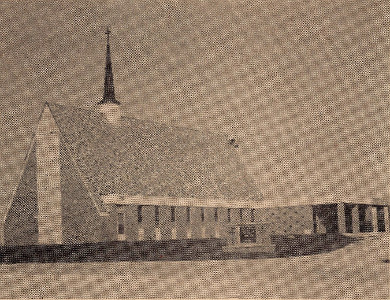
Trinity Lutheran Church
August 17, 1975
Knierim, Iowa
We Dedicate
We dedicate this book and this great centennial event of our beloved church, Trinity Lutheran of Knierim, to the Lord who hath done great things for us; whereof we are glad.
Psalm 126:3
To the brave and farsighted Christian men and women and pastors who founded this church and led the way to God which has endured for 100 years.
To the Christian men and women who serve the Lord at present and to the youth who will accept leadership and willingly serve God in the future.
This is none other but the House of God, and this is the gate to heaven!
Genesis 28:17
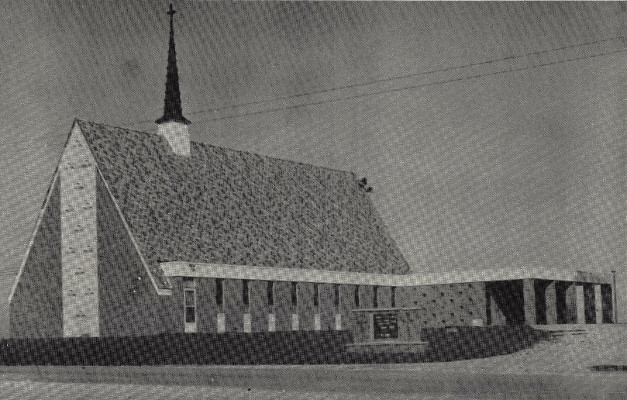
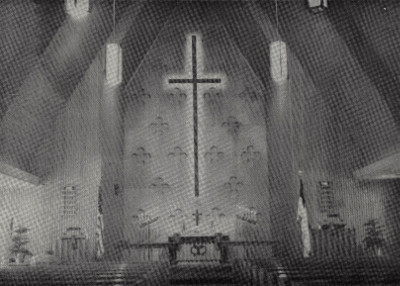
Pastor Robert Heimgartner
Let the word of Christ dwell in you richly in all wisdom; teaching and admonishing one another in psalms and hymns and spiritual songs, singing with grace in your hearts to the Lord.
Colossians 3:16
So then faith cometh by hearing, and hearing by the word of God.
Romans 10:17
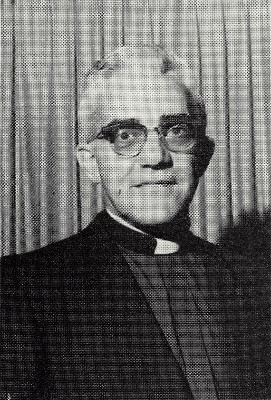
The Reverend Robert Heimgartner came to Trinity of Knierim from Altamont, Illinois, where he served as Pastor of St. Paul's Lutheran congregation for the past 11 years. During his ministry at Altamont, he served on the Circuit Counselor's Cabinet in the field of education for 6 years and also as zone advisor for the Lutheran Laymen's league for 4 years.
Prior to his ministry at Altamont, he served congregations at Burwell, Nebraska; New Holland, Illinois; and Golden and Bowen, Illinois. He served his vicarage year at Janesville, Wisconsin.
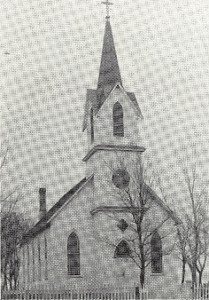
| Roster of Pastors | |
|---|---|
| Theo Mattfeld | 1871-1892 |
| F. Ehlers | 1892-1901 |
| H. Schwenk | 1901-1906 |
| Arthur Hanser | 1906-1909 |
| M. Fleckenstein | 1909-1911 |
| L. A. Mueller | 1911-1932 |
| J. E. Ross | 1932-1942 |
| Theo. Goehle | 1943-1948 |
| A. F. Rehder | 1950-1956 |
| John M. Tews | 1956-1964 |
| Clifford Kaufmann | 1965-1968 |
| Robert Buschkemper | 1968-1972 |
| Robert Heimgartner | 1973- |
The First Resident Pastor of Iowa
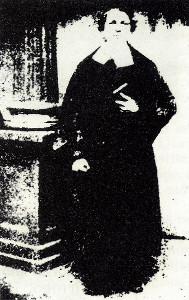
Pastor F. Doescher
It soon became evident that serving the spiritual needs of the settlements in Iowa by a pastor from another state was at best but a makeshift. A man stationed in the field who could devote his full time to Iowa as needed.
Such a man was found in the person of Pastor F. Doescher. Looking back at his activities, one must conclude that Doescher was one of the special gifts which the Lord of the church bestows upon His people at His chosen time, and uses them for such a period as he sees fit.
Doescher was ordained in Iowa City in 1859 by Pastor Selle, who in 1848 had been instructed by a conference in Missouri to explore "the North". This he had done coming by boat as far as Dubuque and exploring the towns along the Mississippi and inland as far as Iowa City. Selle had been a pastor in Chicago when the Missouri Synod was organized. He organized the congregation in Iowa City where Doescher was ordained.
Doescher began a vigorous campaign at once. It truly was a "Gospel campaign". His zeal knew no bounds and he was especially gifted. He became "All things to all men that he might by all means save some." Wherever he found a settlement he preached the Word. He had command of the German language and that of the land and he preached in both languages. He also preached to the boys in camp during the Civil War.
Doescher's efforts were rewarded by his efforts and one year he served 18 stations. It was physically impossible for him to fill all the demands on him so he personally asked Synod for help in 1860 at Fort Wayne.
In 1869 he was called to Fort Dodge and was installed there. Soon he had eight stations as well as his growing congregation. Pastor Theo Mattfeld was sent to Fort Dodge to assist Pastor Doescher and was installed by the Fort Dodge church and from there served Trinity.
Pastor Doescher left Fort Dodge in 1874 for South Dakota territory where he explored nine counties. In 1877 he was installed as our first missionary to people of other races.
Trinity Congregation
There was not a word of all that Moses commanded, which Joshua read not before all the congregation of Israel, with the women, and the little ones and the strangers that were conversant among them.
Joshua 8:35
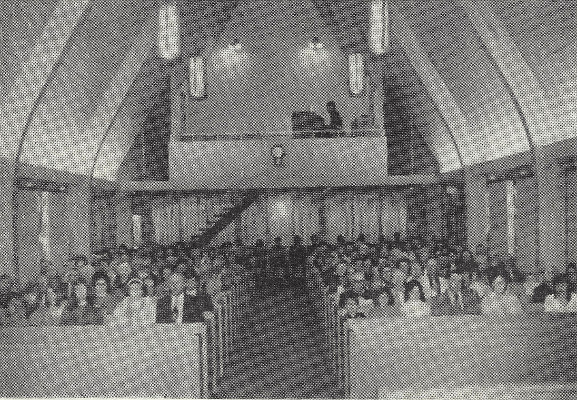
Statistics
Records show that there were 689 baptized members, 332 confirmed. There were 105 marriages and 88 funerals up to possibly the year 1925. In 1950 there were 340 members, 51 voting members, and 54 children in Sunday School. In 1970 there were 342 members with 259 communicants, 86 voting members, 24 baptized and 15 confirmed. In 1975 there are 348 members with 260 communicants, 55 in Sunday School, 9 baptisms, 6 confirmed, 5 deaths, 2 weddings, 4 re-affirmations of faith.
Settling of Iowa
The state of Iowa was settled late in comparison to many of the surrounding states. Illinois became a state in 1818, 28 years before Iowa. The main reason for this was that routes of travel in those days passed our state. No railroads were built until 1856, and then only 67 miles of it. There were no highways of any nature, not even the proverbial Iowa mud roads. Traffic was river traffic along navigable streams, and these touched but the border of our state.
In 1852 there was a veritable flood of immigration. Astounding masses of people streamed into Iowa. Ferries along the Mississippi were busy at all hours transferring canvas-covered wagons marked "Iowa". At Burlington, they were crossing at the rate of 600 to 700 a day, at Oskaloosa not an hour passed but teams were seen western bound. They poured in from all parts of the country, one county in Ohio sending in 1,000 settlers alone. In one year, four million acres of land were allotted to new settlers.
History of Trinity Lutheran Church
German immigrant families moved into northeast Calhoun County in the 1860's and 1870's. When the Missouri Lutheran Synod, already organized in Fort dodge, realized this they sent someone out to investigate those reported to be of Lutheran faith. The church in Fort Dodge was, at this time, served by Reverend Doescher and Assistant Pastor C.L. Lauterbach. The results of the exploratory trip were not encouraging. There were only a few families, the land was wet, there were weather hazards and insect pests such as grasshoppers, many ponds and swamps, and no roads and no bridges.
In 1871, Theo. Mattfeld was set up as a travel-pastor by the Synod for our area. He served the area from Fort Dodge, as often as he could, the few people that lived here, and he became a legend on a white horse, which he rode as far as he could and walked where he could not ride. During this time, a congregation was organized in Lizard Township (north of Manson) and he received a call from them. He accepted this call and served us from there and held service every two or three weeks in homes, the school house that stood where Knierim is, and the Luebke schoolhouse. Knierim was laid out in 1899 and incorporated in 1901.
Pastor Mattfeld was a zealous and inspiring leader. The people of Trinity were people of God. Their faith and the holy spirit within helped them to know that they must have a place for worship, a place to baptize and teach their children, a place for their sons and daughters to marry and a place from which to bury their dead. In 1875, they came forward ready to serve and give to their Lord, and organized the church called "Evangelical Lutheran Trinity Congregation of Lincoln Township". Those present at this momentous meeting to sign the resolution and be our charter members were: John Luebke, F. Mehring, F. Hasselbring, William Knierim, H. Mehring, Carl Ballstadt, H. Grube, August Lichte, A. Rogosch, A. Brandt, Fred Patzack, Lorenz Markert, and R. Stahl.
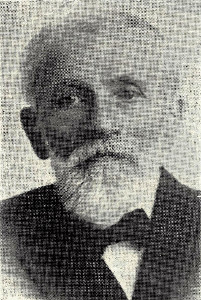
Pastor Theo Mattfeld
In 1878, Pastor Mattfeld organized the Pomeroy church and Immanuel of Rockwell City. The same year, the church of Lizard separated its affiliation from our Synod, and Pastor Mattfeld moved into the Trinity congregation. There was no parsonage, so two acres of land were purchased for necessary buildings and a cemetery.
1886 statistics on record show that Pastor Mattfeld served two congregations that did not belong to the Synod. He took care of 300 souls in these congregations, where there were 133 communicants, 50 voting members, one school with 23 children, he baptized 18 that year, confirmed 10, administered 158 communions, 4 weddings and 4 burials. His salary was $200.
In 1879, the first church was built and it served also as a schoolhouse for 28 years. The one structure served as church, school, and parsonage. The parsonage was on the north end and was separated from the church by a wall. Those who spoke at the dedication of the church were Lorenz Craemer of Fort Dodge and W. Rabe of Webster City.
In 1888, the congregation decided to build a parsonage and removed the wall that separated the church and the parsonage.
In 1892, Pastor Mattfeld received a call to Crozier congregation, a rural church near Storm Lake. He received a peaceful release.
Pastor Schliepsiek of Pomeroy, who was serving as vacancy Pastor, assisted in the calling of the Rev. Fred Ehlers as the new Pastor and installing him into office, June 19, 1892. Pastor Ehlers had been out of office for 1 ½ years because of poor health.
In 1893, a 16' x 18' x 12' area was added to the parsonage. This made it into a 7 room house. By this time, an organ had been purchased by the young people, and carpet and altar and pulpit hangings by the ladies. In 1894 a cistern was dug and bricked up and a basement was added to the parsonage in 1895. In 1894 there were quarterly treasurer reports. In 1884 there were 8 posts for horses, 25 in 1896 and 50 in 1907.
In 1895, January 26, the congregation joined the Missouri Lutheran Synod and sent August Habenicht as its first delegate to the Iowa District Convention.
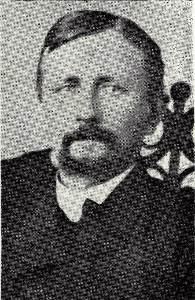
Pastor Fred Ehlers
The first child in the congregation to be baptized was Carl Brandt, son of Mr. and Mrs. August Brandt. This took placed August 8, 1875. The first children of the congregation to be confirmed were Wilhelmina and August Ramthun. They were confirmed August 19, 1887, and it took placed either in their home or the Luebke schoolhouse, for there was no church here at that time. The first marriage was solemnized February 14, 1882. It was the marriage of Carl Schuettler and Emilie Rogosch and the records do not reveal whether it was in church or in a home. The first communion service was on October 1, 1871, and it probably took place in the Luebke schoolhouse. The first burial in Trinity cemetery was that of John Stahl, son of Mr. and Mrs. W. Reimund Stahl. It took place in April of 1879. The records show that Mr. F.W. Luebke was buried in North Lizard cemetery. Prior to this time, members were generally buried on their farms.
In 1896, the congregation decided to build a new church. There was some discussion on building a church with Immanuel of Rockwell City, somewhere in between them. Trinity congregation decided to build its own church and it was carried out in 1897. The contractors were Puffer and Sanders and the building committee consisted of the following members: Carl Ballstadt, Sr., John Luebke, Fred Mehring, William Knierim, Sr., Pastor F. Ehlers, Jacob Hammerle and Martin Markert. The cornerstone laying service was conducted on April 11, 1897. Pastor Ehlers officiated and read a history of the congregation. Speakers for the dedication were: Pastors Anton Ehlers, Schliepsiek and Schaller. Pastor Schliepsiek delivered an English sermon on the occasion, which was rather special in these parts in 1897. The cost of the new church is not on record, but the amount for which it was insured is listed at $1500. Seven acres of land were to be purchased at this time.
In 1890, the confirmation age was 13 years and in 1897 three elders were elected to the church board.
Pastor Ehler's health failed in 1900, and for some time, he was assisted by Student Carl Zollmann. While here the student boarded at the Anton Schofield, Sr. home. Later Student Zollmann became a pastor, but because of throat trouble he changed to law and writing. Pastor Ehler's health did not improve and he gave his resignation to the congregation. He was able later to serve a congregation near Oakland, Iowa.
In 1901, Pastor H. Schwenk came from Aurelia to be installed as new Pastor by Pastor Schliepsiek, who again was interim pastor. Under Pastor Schwenk's leadership, mid-week Lenten services were introduced, a new organ was bought for $100, and a new parsonage was built. The old parsonage was sold in 1902. The twenty-fifth anniversary of the dedication of the first church, then serving as a schoolhouse, was observed. The former Pastors Theo Mattfeld and F. Ehlers were the speakers for the occasion. In 1905 a request was made for an occasional English service, but this proved to be premature. Pastor Schwenk established a parochial school and taught it himself for two years. In 1906 he accepted a call from Ireton and later one from a parish near Ida Grove before retiring from the ministry.
Pastor Rickels of Immanuel of Rockwell City was the vacancy pastor at Trinity until a call was extended to Pastor Arthur Hanser, in office at St. Louis, Missouri. Pastor Hanser began his duties here in 1906. Though Pastor Hanser was not accustomed to rural life, he soon adjusted to it. He did not remain long in this pastorate because the congregation, that he had served in St. Louis as assistant to his father, sent him a call. When they sent him the second call, he felt that he should accept it. The Ladies' Aid Society was organized at Trinity under Pastor Hanser's leadership. In 1908 the church board had increased to four elders. In 1909 the congregation voted to elect two elders each year and each communicant was to be solicited for funds by envelope. Pastor Hanser left here in August of 1909.

Church, Parsonage and School
In 1910, Lenten services were held on Fridays.
Pastor Rickels, again serving as vacancy pastor, guided the congregation to issue a call to its former pastor, Pastor Ehlers. Pastor Ehlers had not yet regained his health, so, he was force to decline. A call was sent to Pastor M.W. Fleckenstein of Buffalo, New York. He can to Trinity in 1909 and served until 1911. During his tenure, English services were conducted Sunday afternoons in the summer of 1910. In 1911, Pastor Fleckenstein submitted his resignation to the congregation to become a representative of Bethany College of Mankato, Minnesota. The congregation was later saddened, when he was accidently killed by the discharge of a shotgun.
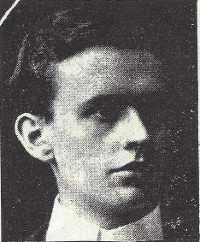
Student Zollmann
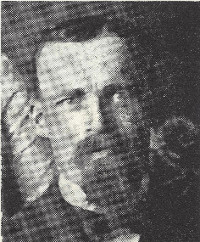
Pastor H. Schwenk
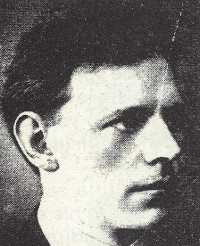
Pastor A. Hanser
Pastor Rickels served the congregation again until Pastor L.A. Mueller, superintendent of the Lutheran Orphanage in Fremont, Nebraska, was called and then installed by Pastor Rickels the first Sunday in July, 1911. Pastor Mueller served until 1932, when he died suddenly of a heart attack. While Pastor Mueller was here, a kitchen was added to the parsonage in 1915 together with many other improvements through the years. He wrote articles for a German magazine published in St. Louis when he was pastor at Wall Lake. Pastor Rehder's parents were members of this Wall Lake congregation and were confirmed and married by Pastor Mueller.
The congregation accepted a new constitution in 1916. The pastor's salary at this time was $850. In 1917, the pastor's salary was raised to $1,000. Each communicant was to put 5 cents and children 1 cent into the collection. In 1918 to be eligible for confirmation, a person must be over 15 years and have had one year of English in school. They must have had two years of instruction to be confirmed. In 1919, workers on church property were to be paid by the hour. English services were held the first Sunday and the third Sunday of the month. Clothing and money were collected for the needy in Germany. Members were to bring the dinner for the Mission Festival. A telephone and furnace were installed in the parsonage in 1920 and the organist's salary raised from $25 to $50. A granary 10' x 12' x 8' was built. The envelope system for the pastor's salary and the church's upkeep was introduced and a decision that there must be at least 6 children or no school was made in 1921.
The twenty-fifth anniversary of the dedication of the new church was held in 1922 on September 22.
October 11, 1925, Trinity observed her fiftieth anniversary. Pastor Schwenk delivered a fitting sermon in German in the forenoon, and Pastor P. L. Bornhoeft of Pomeroy followed with an English sermon in the afternoon. Dinner was served in the schoolhouse.
A resolution was passed in 1926 that cemetery lots were to sell for $10. No owner could sell this lot without permission from the congregation.
In 1927, July 3, the church and parsonage were reinsured for $6,000 and $4,000 respectively. There was to be Saturday confirmation school.
It was decided to have a student preach August 1, 1928, so that Pastor Mueller could preach where called. In months with five Sundays, the last Sunday sermon was to be English. The treasurer from now on was to mail every member of the congregation a financial report.
The voting assembly decided April 7, 1929, to install electric lights in the church and the parsonage. A committee of three - Charlie Brown, Henry Gross and W. C. Habenicht were appointed to buy the fixtures and supervise the wiring. The treasurer was authorized to borrow money if necessary. Later it was decided to collect for same. Two dozen song books were purchased and type was purchased for Pastor Mueller. The porch on the church residence was remodeled.
In 1930, a basement was built under the church. A fence was built on the south side of the cemetery and a sidewalk made on the south side of the house and porch. Confirmation was held in June of that year, and it was decided that whenever communion was given to have only one sermon.
On December 29, 1931, it was voted that the Pastor should print an annual report of the church's business by January 15, 1932. Chairs, used for purposes other than church activities, should have a rental fee of 25 cents if half were used and 50 cents if over half were used.
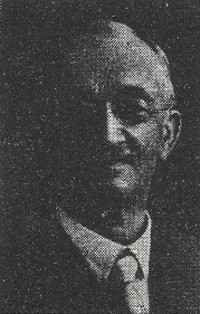
Pastor L. A. Mueller
Pastor L.A. Mueller, born March 20, 1857, passed away January 14, 1932, of a heart attack. He was buried in the church cemetery, January 18.
Pastor W.C. Schaefer was called to fill the vacancy until a pastor could be secured. Mrs. Mueller was given free house and coal to heat it for a month or until a new pastor should arrive.
The congregation chose to call Student J.E. Ross of Concordia Seminary, St. Louis, Missouri. He accepted and after going through the proper channels was ordained and installed at Trinity July 3, 1932, by his father, Pastor P.E. Ross. The pastor's salary now was $1,200 with a free house, free telephone and all but $5 of the light bill. He was to pay his own coal and the congregation to pay the light bill for evening meetings.
Considerable improvements were made under Pastor Ross. A pipe organ was installed, the church was enlarged and a basement built under the entire church in 1939. Church school would now be 4 days a week from September to Palm Sunday and to be confirmed one must have completed the eighth grade in public school. A committee translated the constitution and graveyard ordinance to English and the congregation adopted them April 2, 1933. The resolution to have one sermon for communion and to have mid-week Lenten service at 7:30 Wednesday evenings were adopted. The organist was hired by the year (she at this time was Mrs. L. A. Mueller). The Pastor was authorized to organize a Young People's Society and the choir was allowed to wear gowns. The Regular Order of Service as in the hymnal was adopted. The schoolhouse was to be fixed up for the Young People's Society. The old barn, the hen house and the summer kitchen were to be sold to the highest bidder. The financial report for 1933 was to be printed. The church board was given permission to spend $25.00 quarterly if necessary.
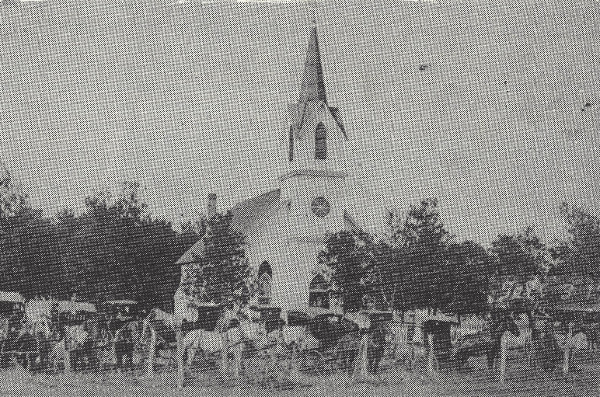
Pastor Mueller's Installation - the first Sunday in July, 1911
Trinity was to have a food stand at the Mission Festival, and it was decided to have the Fort Dodge orchestra at the Mission Festival in 1934. Two dozen hymnals were purchased and it was decided that the congregation would pay for the "Lutheran Witness". A yearly report was to be printed and the second and fifth Sundays were to have German services, the other Sundays to be in English. Three dozen chairs were bought and two collection plates.
In 1935 they voted to dig a basement under the Pastor's study and plant trees on the church grounds. Everyone was to receive a Christmas sack on Christmas Eve. Everyone was asked to contribute to the Christmas fund.
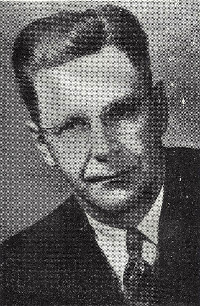
Pastor J. E. Ross
December 28, 1936, it was voted that all Lenten services were to be in English. Christmas Eve service was to be in English, Christmas Day, German; Sunday December 26, English; January 1, in the evening, in German; and Sunday, January 2, in English.
The pastor's salary in 1938 was $1,500.
January 30, 1938, Pastor Ross received a call from St. John's Lutheran church of Germantown, Iowa. He declined as a result of the congregation's vote.
The Ladies' Aid asked for a Parish Hall in March of 1938. The Parish Hall was voted down in July of 1938. Easter Sunrise Service at 7 a.m. and no 10:30 a.m. service was voted. Mission services were to be in German and English in the forenoon of the Mission Festival. Communion was given 10 times during the year, 4 in German and 6 in English. In October, it was voted that all holiday services be in English except Christmas Day, which would have both English and German. The Young People were given permission to join Walther League. It was decided that the names of memorial gift givers not be read at funerals, but be printed in the bulletin.
At the annual meeting, January 2, 1939, the following decision were made: Elders were to be elected for two years, but one year must elapse before he be reelected; the incumbent chairman, secretary or treasurer could be reelected. Respect to the dead and the obituary were to be omitted at funerals. Anyone wishing to be church organist was to receive a trial performance of 6 months. All participating organists were to receive $1.00 per service. The final selection was to be made by the elders and the congregation. Later in January, it was voted that the congregation should rise at funerals when the deceased was brought in, and they should rise at Confirmation services when the confirmands come in and remain standing until in. The obituary was to be read at funerals, but it must be prepared by the family and there be no reference to the deceased in the sermon. Sunday School teachers were authorized to appoint their Sunday School Superintendent for one year. The Pastor and the church board were given authority to release or accept communicant members to and from other congregations.
The trustees were given authority in 1940 to sell the schoolhouse at public auction because there was no further need for it. At the annual meeting in 1940, the voting assembly decided that nominations for office should henceforth be made by ballot. Adult confirmation classes must receive 20 or more instruction sessions before they may be confirmed. The church basement was reserved for congregational affairs and permission for same was to come from the Chairman or Elders from the church board. The congregation was to pay the over-run on the lights. The congregation's financial report was to be printed. It was also decided to pay convention delegate expenses which included meals, transportation, lodging and registration. The Pastor was asked to put in the bulletin that the three benches in the back of the church be left for visitors and late comers. It was voted to designate the third Sunday in September as our anniversary Sunday for 5 years and then celebrate the 75th anniversary. On October 5, 1941, the voters voted to discontinue German services January 1, 1942.
At the annual meeting voters decided that officers should be voted for by ballot, and the elders be voted from the three with the highest vote on the first vote. A ballot vote should be taken for one member of the cemetery committee, and the Sunday School Superintendent also be elected. Pastor Ross was to be janitor and Mrs. Ross was to be organist for one year. The envelope system for congregational giving was to be tried in 1943. The church board should now appoint three people to be a finance committee. $50 of the budget would be used for "Lutheran Witness".
Pastor Ross resigned his pastorate here in 1942 in order to join the United States Chaplain Corps. He was released at a special meeting November 17, 1942. Pastor Ross served an Air Force unit primarily in the pacific theatre of operations. After his discharge, he served a congregation in Aurelia, Iowa until he received a call and accepted it from Olive, California. Pastor Ross died at Marysville, Washington, on March 10, 1971.
The interim pastor, who served Trinity after Pastor Ross, was Pastor Emeritus E. Lehne of Fort Dodge. A call was sent to Pastor Theo. Goehle of Sandstone, Minnesota. He accepted the call and was installed by Pastor Lehne, May 16, 1943.
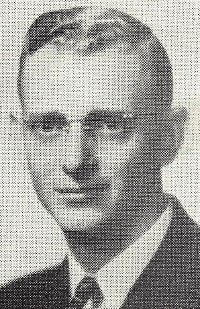
Pastor Theo Goehle
At the 1943 annual meeting, the church board officers were elected by ballot, the Sunday School Superintendent was elected by ballot and a finance committee appointed with terms of office 1 year, 2 years and 3 years, so that one would be appointed each year. Lenten services were on Wednesday evenings at 8 o'clock, and the congregation decided to buy a mimeograph if they find one. Sidewalks were made on the south side of the church and church time was set at ½ hour later in November.
Voters at the annual meeting in 1944 accepted a budget for the year; money received for cemetery lots was put in a cemetery fund with chairman of the cemetery committee in charge of the sale of cemetery lots; the Pastor was to receive $10 per month for auto expenses; $50 of the budget was to be used for the "Lutheran Witness"; the second vote for officers to be elected was to be on the two with the highest vote on the first vote; a building repair fund was to be set up under the supervision of the elders; and the Pastor was to serve as janitor for the year.
During the year of 1944, it was decided that mourners at funerals were from now on to sit in the west pews. Church was to start one-half hour later in November, and it was resolved to have a joint memorial service for all those killed in action after the war was over. A "V Day" service was held the following Sunday. The new church name of Lutheran Church Missouri Synod was accepted. The chicken house was destroyed by fire and November 12, 1944, it was decided to build a new one for chickens and a cow barn. The church board was in charge of the building project.
A budget was accepted again in 1945. The Pastor's salary was raised $10. The janitor and the organist were to receive $10 per month, and the Pastor was to serve as janitor and Ruth Consier as organist. The "Lutheran Witness" was to go only to those who subscribed to it, and home budget secretary go to the finance committee. Ushers were used again. The church was decorated during 1945 and the altar was changed to white with gold leaf. Olson painted it and later the outside of the church too. The Pastor was given two weeks' vacation and the church accepted membership in Lutheran Old People's Home at Williamsburg for $10. Church time was not changed for the winter months.
In 1946, the Pastor was given permission to exchange pulpits with Pastor Hienie of Knoke during mid-week Lenten services. The Pastor's salary was set at $2,000 and the organist's salary was $15 per month. The parsonage was greatly in need of repair, so a committee was appointed to study what should be done, and to put an oil-burning furnace in the parsonage and an oil-burner in the church furnace. It was decided the best thing to do was to build a new parsonage, but before much progress had been made, Pastor Goehle received a call from Lake View and accepted it. He preached his farewell sermon here September 30, 1948. The voters had increased the Pastor's salary by means of a bonus of $240 to be paid quarterly. The janitor's pay was raised to $20 per month in the summer months. The treasury paid for devotional booklets for each family.
A drive for funds for a new parsonage was organized into 4 districts; the northeast was under supervision of William Knierim, the northwest under Walter Mehring, the southeast under Charles Freimuth and the southwest under Walter Vosberg. These districts were first set up when the church was painted in 1945.
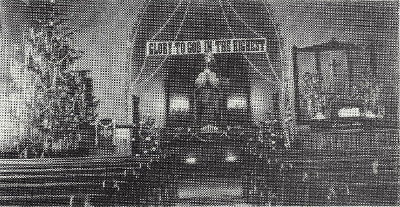
Altar decorated to God's glory - Christmas 1940
Pastor Goehle was given permission in July of 1947 to organize the Lutheran Laymen's League. On October 12, 1947, it was resolved that new chairs bought should have a rental fee of fifty cents for one dozen and $1.00 for anything over one dozen when borrowed for outside use. Sunday School teachers were to receive a gift of a Bible as a vote of thanks for their services.
In 1948, at the annual meeting in January, the building funds were put into E Bonds and the Pastor's auto expense raised to $35 per month. Sunday School teachers were to receive a gift not to exceed $10. It was decided at a later meeting to hold all regular meeting on Monday evenings at 8 o'clock. The church would pay all expenses for Vacation Bible School and a larger lawn mower bought. April 11, it was voted to eliminate quorum for all meetings properly called. At a special meeting in May, the Knierim Coop Elevator was given permission to use the church basement for their annual meeting. On July 12, 1948, it was voted that there be no Sunday funerals. No member could be released until all financial obligations were met, and a new election rule was passed that the nominating committee, including the Pastor, appointed by the chairman or elected by congregation, should propose two candidates for each office to be filled and the slate of officers be presented to the congregation at the meeting preceding the election meeting. The congregation could amend or revise the slate. The slate of candidates, agreed upon by the voter's assembly, was to be announced to the whole congregation before the election. The election was to be by ballot. Unless protest were entered and sustained, the candidates receiving the majority vote would be considered elected, which vote then became unanimous. All officers elected to their respective office would be publicly inducted into office the Sunday following election. Every officer shall faithfully discharge the duties delegated to him by the constitution, the by-laws and congregational resolutions.
Pastor Goehle was released August 15, 1948, but he remained here until October 1, 1948.
October 4, 1948, the nominating ballot was presented as stipulated in the new election law. Restoring the old parsonage was still considered. The Extension Fund drive by the synod was supported and the Order of Morning Service as printed in the hymnal approved.
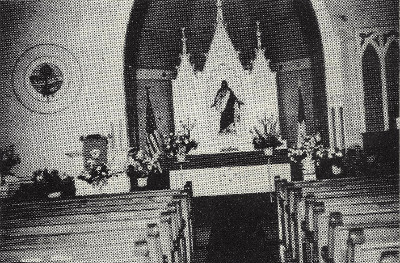
White gold leaf on altar - 1945
Pastor E.E. Aulick of Fort Dodge cared for Trinity until it received its next Pastor. The congregation voted, November 30, to build a new parsonage and sell the old one by sealed bids, the bids to be in by January 1, 1949. At the January meeting, the annual meeting, the bid of $1,025 was considered too low and rejected. They voted to place the house in the hands of a selling agency for 30 days at $2500 net. The church board was authorized to borrow the balance on the parsonage. Lenten envelopes were used instead of Special envelopes.
In April, at the quarterly meeting, the plans of Southbrook house with minor changes, was accepted. The building committee: William Busse, W. G. Knierim, Al Strutzenberg, Anton Schofield and Kenneth Gerth were to serve with R. G. Brown, who was the congregational secretary, now to serve as building treasurer. Envelopes for giving were now to be for husband and wife combined. Knierim Elevator was given permission to use the basement for their annual meeting. The treasurer was instructed to raise the insurance to the limit and it was decided that the basement walls of the new parsonage be of clay block from the footing to the top. $500 of the Habenicht Bequest was transferred to the general fund. The Walther League was to contribute to the Christmas collection by envelope. The elders were authorized to choose one man on the nominating committee. Insurance was raised to $1,500, and the elders were put in charge of a special canvas for funds at a meeting in November. The church organist was given 2 weeks paid vacation, October 4, 1949.
It was November of 1949 before Pastor A.F. Rehder was called. The call was delayed until the new parsonage was completed and so it was February 19, 1950, before he was installed by Pastor Aulick. Pastor Rehder and family were the first family to live in the new parsonage, which cost around $18,000. Consecration service and Open House were held on Sunday afternoon, August 13.
The new Pastor's salary was now $250 per month, car allowance was $25 per month and the congregation entered the Pastor's Pension plan. The voter's assembly voted that the expense report for 1949 be made and that the Church Board and the Pastor be in charge of the Diamond Anniversary to be observed October 22, 1950.
Special preparations were made for the Diamond or 75th anniversary. Toilets were installed in the basement by the elders and Ladies' Aid, and a light put on the railing on the basement stairway. The organ was repaired and the Ladies' Aid put in charge of chair rentals, not the Pastor. 350 Anniversary books were ordered from the Manson Journal, who printed them. Anniversary plates were ordered and handled by the Ladies' Aid. There were three services scheduled for the day, special music by the choir, and a noon meal and evening meal served by the Ladies' Aid and all the church women. The pastor who spoke for the morning service was Pastor William Krengel of Marion, North Dakota, a son of the congregation. The afternoon service was in charge of Pastor O.E. Weiss of Webster City, Visitor of the Fort Dodge Circuit; and for the evening service, the sermon was by Pastor W.H. Discher of Clarinda, a vice-president of our District.
In 1951, it was decided to have individual annual reports of the Sunday School and other church organizations. Quarterly financial reports were to be sent to members. Those who wished devotional booklets were to subscribe for them. The Pastor was instructed to send envelopes to the members asking for $5 per family to clean up the church debt. It was decided to pay $5 toward Lutheran Layman's League convention expense. On October 2, the following constitutional change was voted: all male members 21 years old and over are voting members. Voting members are subject to the District Constitution. Later the Ladies' Aid was given permission to solicit the entire congregation for a benefit supper once a year. The Pastor was given permission to make a stage in the basement.
In 1950, there were 340 baptized members, 51 voting members and 54 children enrolled in Sunday School. The first voting member were meticulous for parliamentary procedure in the business meeting. In 1884, a resolution was passed that everyone who wished to speak, must first get permission from the chairman, and stand while speaking. First records were written in German but since 1926 the minutes of the meeting have been kept in English. Trinity congregation was incorporated in 1884. The material for the first parsonage cost $382.47. The first mission festival was held in 1890, and the first organist was Albert Ballstadt. The bell, hung in the new church steeple in 1897, weighed 978 pounds and cost $153.03.
On January 7, 1952, it was voted to have 4 trustees to correspond with the number of elders. It was decided to keep the building fund separate and R.G. Brown to remain as its treasurer. The building committee was released. The balance of the car fund was given to Pastor Rehder, and he was given authority to accept or release members, but not voting members. Non-attending members were given 6 months to attend. After the 6 months, they would be contacted and then, if after 6 months there was no response, dropped from church membership. The elders were to choose ushers in case of strangers or large attendance services. The large gate into the cemetery was to be locked and a small gate made. The trustees were to put cement around the cemetery stones. A blanket subscription was voted for the "Lutheran Witness" to be paid by special envelope and the balance by the treasurer. Trees should be planted along the sidewalk.
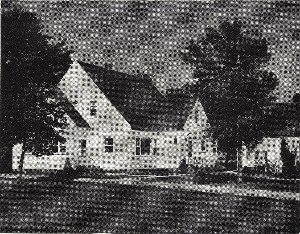
Trinity's Prasonage
Picture taken 1950 - Former church to the right
In October of 1952, it was decided that non-attending members be given one year to attend, and then the Pastor contact them. In 6 months the elders were to contact them and then, if no response, they were to be dropped from membership. The Pastor was to be in charge of the World Relief program. The finance committee could select collectors for drives for funds approved by the voters' assembly.
At the annual meeting in 1953, it was decided to have 4 members on the finance committee instead of three. The term of office was 2 years, and each one was to be in charge of finances one quarter of the year. The treasurer was to be allowed $100 per year expense money. The Sunday School Superintendent was to be elected by ballot for 2 years. The Pastor was to receive a bonus of $200.
At the quarterly meeting, it was decided to move the garage, give the Pastor 2 weeks' vacation and the treasurer pay $30 each year to the Sunday School for films.

Pastor A. F. Rehder
In 1954 compensation insurance was dropped, but liability kept. The old garage was to be sold and a new one built. It was voted, that the back three seats of the church should be reserved for parents with children. Children, under confirmation age, were not to be allowed upstairs (balcony) without their parents. Insurance on church property was to be in one policy, from now on, due January 3 each year. The Sunday School teachers and spouses were to be treated to a supper. October 5, it was voted that the elders were to serve as the nominating committee.
In 1955, voters' meetings were to be held after church each month on the last Sunday of the month. The congregation was to be ushered out beginning with the front rows and ending with the balcony.
The three front seats in the balcony were to be removed. Prayers were to be requested after burial. The Sunday School was to buy 12 small chairs to be paid for by the congregation. The Sunday School teachers feed was to be an annual affair. Apples given to adults as a Christmas treat was discontinued. The Pastor's salary was $325 per month and the janitor was to be Bert Rehder.
Pastor Rehder was given permission to serve the Knoke church on January 22, 1956.
Pastor Rehder received a call to Lincolnville, Kansas, on January 8, 1956. January 22, 1956, the voters asked him to stay with a standing 100 percent vote. The Pastor asked for his release, and a peaceful release was given. From Lincolnville, Kansas, Pastor Rehder and family went to Wisconsin. There he served a dual parish in Cleghorn and Fall Creek: Zion Lutheran of Cleghorn and St. John's of Fall Creek. His health failed and he died in August of 1963. Mrs. Rehder passed away in Alta, Iowa, at the home of her father, in October of 1968. Both are buried in Trinity cemetery. The family was given a cemetery lot.
Pastor Weber was present, and Pastor Witzgall was invited to be present, at the first call meeting. It was decided at this meeting that only one notice was to be required, when giving a call to a pastor.
Pastor John M. Tews was called April 23, 1956. He accepted and it was voted June 17, to have a grocery-installation shower for Pastor Tews and family. Pastor Tews was installed with Pastor Weber in charge.
In 1956 a telephone was installed in the church. A safe was purchased in 1957 for $35 to keep church papers in. In 1958 two canopies were voted for the parsonage, the trustees were to oversee rewiring in the church and the secretary was to list the names of members, accepted, transferred or released in the minutes of meetings. An adding machine was purchased, and crushed rock put on the parking and lane. The organist and choir director were to go to a special training meeting at Lake Okoboji. Pastor Tews was given permission to serve Immanuel of Rockwell City as vacancy pastor.
On May 31, 1958, the church was struck by lightning and burned to the ground.
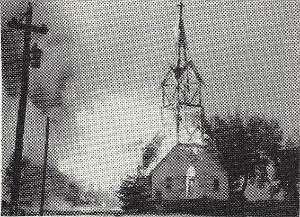
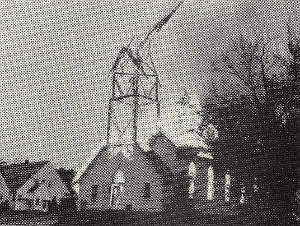
The town council of Knierim and the Manson school were contacted in an effort to find a building for worship and Sunday School. It was decided to worship in the Knierim town hall and have Sunday School in the schoolhouse. 150 chairs were purchased with the help of the Ladies Aid. Bernhard Busse was in charge of the insurance money. The following committee was elected to make some future plans: Walter Neubaum, Walter Pohl, George Geske, Albert Omann, and Al Strutzenberg. Later two ladies were added to the committee to act in an advisory capacity. The chairman of the church board, Kenneth Gerth, was authorized to sign the insurance papers for the congregation.
On June 22, 1958, Trinity voted to build a new church. The planning committee was to be the building committee and the chairman of the congregation, Kenneth Gerth, and Bernhard Busse were added to the committee. Bernhard served as building treasurer.
A questionnaire on where the site of the new church should be, and if it should have a basement or be on ground level was submitted to the congregation. The decision that was made, was that the site was to be west of the parsonage, and the church was to be on a ground level with no basement.
Hymnals for $1, the cross, candlesticks and collection plates were purchased from Iowa District West. Insurance was carried on hired help for 90 days, and the Lutheran Layman's League was given permission to clean the old church basement. Guy Brown was released as building treasurer.

Pastor John M. Tews
Maiwurm, architectural firm of Fort Dodge, submitted building plans and the vote to accept them was unanimous. The ground level "T" shaped building was accepted, and the contract let to Burgeson Construction Company of Pocahontas in January of 1959. The mechanical contracts were let to Peter's Electric of Palmer, Jeffords Plumbing and Heating Company of Fort Dodge and Rhoades Heating Company of Jefferson, Iowa.
Hawkeye Cabinet Company of Humboldt furnished the cabinets, the pews were purchased from Gunder Manufacturing Company of Humboldt and the chancel appointments were furnished by Concordia Publishing House, St. Louis, Missouri.
The total cost of contracts was $85,000.00. The building with its equipment cost the congregation $98,000.00. Besides this, there were many memorial gifts given to complete the many things needed.
Ground breaking service was April 5, 1959, the cornerstone was laid May 10, with Pastor Herman Witzgall delivering the sermon for a special service. Trinity congregation moved into their new house of worship on February 14, 1960. The congregation gathered at the Knierim town hall at 10 o'clock, and then went enmasse to the new church taking their church equipment with them. Consecration services were held February 14, but the dedication of the new church was held on May 15, 1960. Pastor O.W. Luecke, Counselor of the Fort Dodge Circuit, delivered the dedication sermon in the morning, and former Pastor A.F. Rehder spoke in the afternoon. All past Pastors were invited and all former members.
Many decisions in regard to worship in the new church were made. Boys of the confirmation class were to light candles and they were to wear white jackets; the people were to be ushered in and out of the church; the congregation was to kneel for communion; the balcony was to be for the organist and choir only unless ushered up; the choir was to receive $50 each year for music; the finance committee was to be in charge of a drive for funds; the Lutheran Layman's League was to have another God's Acre program; and the Nave was to be locked unless under supervision at social gatherings.
In 1959 it was voted that an Assistant Sunday School Superintendent be elected annually, later it was voted that an assistant be elected each year instead of electing a Sunday School Superintendent and the assistant elected become the Superintendent the following year. An assistant was elected January 25, 1959. It was also decided that members were to pay for their dedication booklets.
Two dozen cheap chairs were purchased that could be rented out. Later it was decided that church property, other than the inexpensive chairs, would not be loaned out. Exceptions could be made to other churches.
David Tews, son of Pastor and Mrs. Tews, died accidentally September 3, 1960. Davie was born November 23, 1948 and was buried in Trinity cemetery September 6, 1960. The congregation paid the funeral expenses and gave the Tews family a cemetery lot.
Pastor Tews received a call from Lake Park in December of 1960, but declined the call.
At the annual meeting January 9, 1961, it was voted that the treasurer be paid actual expenses and the $100 salary be dropped. The two-sides envelope for member giving was kept. A cemetery committee of two trustees was voted. The trustee, elected each year with the highest vote, was to serve on the cemetery committee. It was voted to revise the constitution, the church council to be in charge of the changing.
The motion made before in regard to non-attending members, who do not come to church for 6 months, was to be taken off the books. God's Acre and Wages program was now to be a congregational program. The building committee and treasurer were to stay on for another year. The building treasurer received $50 for expenses. Paint for the parsonage was allowed with the Tews family agreed to putting it on. In regards to the God's Acre program, it was decided that the money be used for the principal of the building debt. This decision was made October 1, 1961.
Pastor Tews was authorized to serve as vacancy Pastor at Deer Creek Trinity church as of July 16, 1961.
In 1962 the building committee was released, but the building treasurer retained. The elders were given permission to call a meeting to work on a new constitution. The voters decided to have a separate Mission Festival. In March of 1962, it was voted to have evening questionings for the children's confirmation class. The questioning was to take place before the church council, the children's families and any interested persons. The rite of confirmation was to follow during the following Sunday morning service.
In May it was decided to have the children meet one Saturday a month during the school year instead of the two-week vacation Bible School. The length of the Saturday session was to be determined by the Pastor and the church board. The cemetery committee was given permission to set up a perpetual care fund on April 29, 1962. In June the Art glass Window representative from Winona, Minnesota, met with the church board. In July these windows were approved as memorials to replace the original church windows. The Busse family bought two. The replacement of windows was to start from the front of the church. Stanley Wade was accepted for Student Aid. The Synodical convention was to be held every two years instead of every three. In November World Missions was raised to $4,500.
In January of 1963, it was voted that a committee of three were to act as the cemetery board. Francis Bowman was asked to remain on until the perpetual care fund was established. The other two members were from the board of trustees. The $500 of the Habenicht Bequest was returned from the general fund to the cemetery perpetual care fund. It had been transferred to the general fund in October of 1949. Pastor Tews was given permission to attend Pastoral Counseling Training School. Pastor Tews received a call from Boone and Klinger congregation and declined it. The congregation sponsored one member of the Walther League and the Walther League sponsored one member to the Walther League Training Institute. The Ladies' Aid gave $50 to be used for landscaping the south side of the church.
Later the Cemetery committee was given authority to invest the perpetual care fund as they saw fit, and at the best rate of interest. In August 1963, Pastor Tews was given permission to take an extension course at Iowa Methodist Hospital in Des Moines to get his one hour of college credit that he needed. It was also decided, that a student to qualify for the Student Aid Fund, must have finished High School, and the money allowed was not to exceed $500 in one year and the money was to be divided according to need and academic qualifications. No individual may receive more than $300 in one year. If the recipient serves the church 3 years, it becomes a gift. To qualify one must be a communicant member of Trinity one year or more. The money is to be paid directly to the school involved and parents and the student are to sign the note. A board of three members are in charge of Student Aid. They are to be appointed one each year for a three-year term of office. The treasurer was authorized to borrow money for the congregation if the need arose and it was to be with the approval of elders. If the student fails to complete the work for reason other than health, the aid it to be paid back 25 percent each year.
October 9, the Cemetery constitution proposed to govern the Trinity cemetery was accepted. Four grave sites were given to Edgar Luebke and wife for land on the north edge of the cemetery.
November 4, 1963, Pastor Tews asked for his release as of January 1, 1964, to go to Fort Wayne, Indiana, as hospital counselor. The congregation voted to honor Pastor Tews on the 25th anniversary of his ordination, and granted him a peaceful release.
Before Pastor Tews left, the following constitutional changes were voted on November 23, 1963: The congregation each year was to elect an Assistant Sunday School Superintendent. He is to serve a year as an assistant and the following year assume the responsibility of Sunday School Superintendent for one term. He cannot succeed himself as Sunday School Superintendent, but can be reelected as Assistant Sunday School Superintendent. Drop Item B- voting membership from the proposed constitution. It was then voted to accept the new constitution and send same to the District for approval.
Pastor Sylwester of Immanuel of Rockwell City was proved as the vacancy pastor, and the church was locked during the vacancy. The janitor received $15 per month for 6 months for car expense to take care of the additional driving. A call list of Pastors and list of mid-year graduates from the Seminary was requested.
The mission goal in 1964 was raised to $5,000. Francis Bowman was appointed to serve as secretary and treasurer of the cemetery board for three years. A budget of $17,200 was accepted. The organist's salary was set at $4 per regular service. Acres and Wages for Christ became a permanent project, with the elders and trustees in charge. Trinity became a member of the Home Finding Society, January 27, 1964. The request for the name of a candidate was made to the President of the District.
June 29, 1964, it was voted to amend the by-laws of the new constitution to Article 8, No. 11 concerning the Board of Trustees. It was amended to read: Only those having reached their 21 year shall be eligible for office.
July 27, 1964, the cemetery lots of Pastor Tews and Pastor Rehder were included under perpetual care. The four grave lots to Edgar Luebke, for land on the north side of the cemetery, were included under perpetual care.
Other decisions, made later, were to allow $60 per month for car expense to the new Pastor whoever he might be, and bulletins were to be mailed to absent members once a month.
December 15, 1964, Pastor Sylwester was released as vacancy Pastor because of illness. Pastor Brandt of Deer Creek church was accepted as vacancy Pastor to succeed Pastor Sylwester. The salary was to be $350 per month and $100 per month was allowed for car expense.
A budget of $17, 024 was accepted in January 1965. The Student Aid deficit was borrowed from the general fund. It was voted that the new constitution would be in effect January 4, 1965. Pastor Brandt offered to mimeograph the new constitution, and was accepted. It was decided to hold business meeting on Monday evenings until a new Pastor was received. Bulletins were to be mailed each week by request only. The church and cemetery would share equally in the cost of mower upkeep.
In February, the Sunday School teachers were allowed $35 for district convention expense. In March, the folding tables were loaned to Trinity of Deer Creek for their 75th Anniversary. A new Pension and Welfare plan for the Pastor was adopted. The Ladies' Aid was given permission to make a picture album of the confirmation classes. Mothers of the confirmands were responsible to see that a picture is available each year.
In May, the trustees obtained insurance on the mowing equipment and the cemetery board was given permission to use it. The roll call of the voting members present was added to the minutes of the meeting. Delegates to the convention in Detroit received a share of their expenses.
Pastor Clifford Kaufmann accepted a call to Trinity and was installed here by Pastor Brandt. This was his first pastorate.
August 30, 1965, the motion to observe our 90th anniversary on Thanksgiving-day was made. A special effort was made to wipe out the building debt. It was decided to have mid-week Advent services.
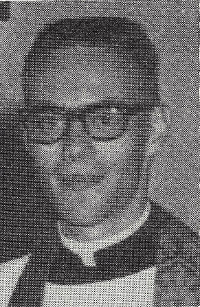
Pastor Clifford Kaufmann
In October, it was decided to put a private phone in the church instead of the extension on the parsonage phone. The congregation assumed the cost of Sunday bulletins and the water softener which up to this time has been paid by the Ladies' Aid. A new gas furnace for the parsonage was voted. The Pastor's salary was set at $400 per month, $50 for utilities and $60 per month for a car.
It was decided to designate $25 each month to the Home Finding Society at the meeting in November. This designation was to be part of the 1966 budget. Youth Activity Insurance was approved and the Walther League was given permission to have dances, under supervision, for recreation. This was not to be a public activity.
At the annual meeting in January, 1966, publication of individual contributions to the church was dropped for two years. A new organizational procedure for the congregation for one year was adopted, but a unified budget was turned down. The new congregational organizational procedure gave the church board freedom to make decisions of worship, education, stewardship, evangelism, etc. Expenditures up to $300 or a figure set by the voters could be made by the church board, but they were bound by the total budget approved. 7 out of 10 on the Board had to approve decisions, and complete reports of their decisions had to be made at quarterly meeting. The budget for 1966, set in November, was $17,712.
In February it was voted that the names of those making and seconding motions must be included in the minutes. Dividers for the fellowship hall were proposed. Pastor Kaufmann was given permission to act as chaplain for the Lutheran Home Finding Society, Fort Dodge, for one year, one day a week. Larger envelopes for collection purposes were approved.
July 11, the church council was given authority to act on transfers. The church agreed to act on the "Community Action Program" and the "Ebenezer" program. The Guidelines for the Lutheran practice of "Close" Communion was accepted. Acres and Wages for Christ was accepted. It was agreed that the girls at the Home Finding Society that are Lutheran were to be given communion. In October a petty cash fund of $50 was set up and permission to use the church facilities for Head-Start was given (War on Poverty). The Pastor was to pay small bills from the petty cash fund and keep a records.
December 5, 1966, it was decided to have a "Mortgage Burning" service on January 1, 1967, and invite Pastor Tews. The mission budget was set at $5,000, and the Pastor's car expense raised to $83.33 per month. The organist was to have mileage for December.
January 10, 1967, at the annual meeting, Pastor Tews was given $100 for his service at the "Mortgage Burning" service. Acres and Wages money was to be divided into the building fund and mission purposes. From now on, cemetery lots were to state the size by measure and not number of graves. Grave decorations would be permitted for two weeks, and if left longer to be removed by the caretaker. The church would support the Sunday School by $100 each year. The Pastor's car allowance was raised from $600 to $1,000 for the year. At a later meeting, the treasurer was allowed $100 for mileage. The trustees were given authority to hire the janitor. It was decided that the janitor be paid $10 for the use of both the kitchen and fellowship hall, $5 for the use of one of them or the user clean it himself. The janitor was hired for $1.50 per hour and the resolution that the congregation clean the church twice each year passed. A motion was passed in July, 1967, that the constitution be changed to read all male members became voting members at age of 21.
Pastor Kaufman asked for a leave of absence August 20, 1967. It was granted.
At the annual meeting, January 8, 1968, it was decided to publish the individual member's contribution list (scandal sheet) for 1968. The motion that all male members reaching their 20th birthday be voting members and able to hold office one year after becoming a voting member was passed. A motion to revise the suggested amendment for Constitution Art. XIII, B3 to read one-third instead of one-half quorum was passed. Proposals III, IV, V, as amended be adopted, carried. Motion on No. X in the other sheet did not carry. Acres for Christ were continued as of Item C, with the people allowed to designate the place their pledges were to go. This was to be a trial plan for one year. The balance of Acres and Wages, 1967, was to be invested for interest. The Pastor's salary was raised to $440 per month and the car allowance to $1,500. The janitor's salary was raised to $1.75 an hour.
January 28, 1968, Pastor Kaufmann was given a peaceful release.
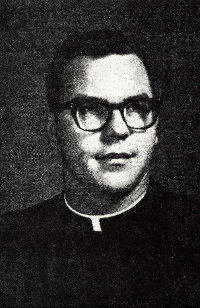
Pastor Robert Buschkemper
February 5, 1968, the voter met to approve Pastor Brandt as vacancy Pastor and allowed $500 per month salary. February 22, 1968, it was decided to call a candidate for pastor. The janitor's salary was changed to $100 per month. The new Pastor was to receive $4,800 salary, $720 utilities, $1,000 car expense, the Concordia plan plus moving expense. The petty cash fund was removed. The new typewriter and mimeograph were returned and rent on them paid ($80) out of Acres for Christ money. The congregation voted, April 4, 1968, to support Vacation Bible School. The elders and the Sunday School Superintendent were authorized to pick an assistant Sunday School Superintendent. Church time was set at 9:30 a.m. and Sunday School at 8:30 a.m. for the summer, and the Sunday School teachers received the $8 membership fee for the district teacher's meeting at Storm Lake.
Pastor Robert Buschkemper accepted the call to Trinity and was installed July 7, 1968, by Pastor Brandt. Programs were printed for the service and the Ladies' Aid served refreshments. Pastor Buschkemper was given permission to be ordained in his own church before coming here.
Carpet for the entire hall of the church was bought in August. The annual meeting for 1969 was held January 6. The money for a bell tower, in Acres and Wages and the building fund, was to go into an open account until it reached $500 and then a certificate was to be bought. Swieden was to come in February to discuss the bell tower. The Pastor's salary was raised $25 and car expense increased to $100 a month. A budget of $18,930 was accepted and the mission goal set at $4,500. The individual giving (scandal sheet) list was dropped. The building fund closed. The Pastor gave an annual report of church activity.
On May 5, 1969, the Pastor was given permission to serve as youth counselor at lay camps July 6, August 10 and October 12. All church funds were put under the control of the Treasurer. The treasury was to be audited each year. October 7, 1968, young people were given one vote at church council meetings. August 12, 1968, it was voted that the congregation would buy the text books for the confirmation class. Bible School was cancelled for 1968.
Immanuel Lutheran Church of Rockwell City was congratulated on its 90th anniversary.
Pastor Brandt was paid for half of July and Pastor Buschkemper for all of July. Money from Acres and Wages was used for a mimeograph, Church Youth Research, and it was proposed to put church signs on Highway 5 and 20. The cost of the road signs should be around $100. Guest speakers were to be paid $15 and 8 cents per mile. New Year's Day service was dropped.
August 11, 1968, a motion was passed to file Articles of Re-Incorporation. Articles of Incorporation were filed May 12, 1924, to expire may, 1974. Articles of Re-Incorporation were filed to change the name of the church from "German Evangelical Lutheran Church" of Lincoln Township, Calhoun County, State of Iowa, as filed in 1924, to read "Trinity Lutheran Church, Lincoln Township, Calhoun County, State of Iowa. The Articles were amended for another corporate 50 years. This was in accord with the provisions of Chapter 504 of the 1966 Code of Iowa, for Record in the office of the Secretary of State, State of Iowa. They were filed September 16, 1968.
February 4, 1969, it was voted that a member of the finance committee would be in charge of memorials. The trustees were authorized to fix the church sign. The Church Council recommended an Adult Bible class for a six-week period, to begin April 10. The fiscal year was changed to the calendar year and the date of the annual meeting adjusted accordingly.
March 9, 1969, the voters decided on a bell system rather than a bell tower system. April 7, 1969, the building fund was transferred to Acres and Wages. The balance on the church was to be paid from Acres and Wages. A motion was passed, at this meeting, to have single pocket collection envelopes and to pay one-twelfth of the mission budget monthly. The fiscal year, from now on, ends December 31. They voted to re-roof the north side of the parsonage.
At a council meeting, June 16, it was voted: to achieve better stewardship of accounting for all funds, that the treasurer be in custody of said funds, which be expended by the authorization of the fund chairman, the voters. Be it further recommended, that the secretary be authorized to issue checks, should the treasurer be incapacitated. This motion was approved July 14, 1969. Sunday School was dropped the first four Sundays in August.
September 8, it was voted to keep 80 percent of Acres and Wages for Christ for the home fund and 20 percent for missions. The finance committee was put in charge of stewardship for the congregation. These two motions were approved October 6, 1969.
It was decided to use $1,500 for carpeting and on a vacuum cleaner. The balance was put into a fund for a new organ. The work on the church sign was donated by Harold Miller and David Holst. The treasurer was added to the finance committee for stewardship of the congregation. The Pastor was permitted to attend a three-day schooling in St. Louis. He was paid by the Lutheran Home Finding Society, where he was serving as chaplain. An organ and a carpeting committee were appointed in November. In December the organ committee was authorized to select and buy an organ to their liking within the range of $7,000.
At the annual meeting, January 19, 1970, the voters decided the 20 percent of Acres and Wages to go for missions, should be channeled to mission outside of the church. District missions received $110.20. Voters meeting were set up adjusted to the calendar year. Nominations and the budget proposed could be presented in November. A constitutional study group was recommended.
Permission was given to the Reverend Carol Youse, LCA, to speak on Urban Affairs Training Center for Christian Mission in October. A fee of $10 for the private use of the fellowship hall was passed. Half of it was to go to the custodian.
An Allen organ was purchased and plans were made to dedicate it. It was decided that Professor Jerome Schwab, music department of St. Paul's College, Concordia, Missouri, would present a concert for the dedication of the new Allen organ, January 31, 1971, at 7:30 p.m. The expense was to be $75 plus.
Knierim Trinity Church received a bequest from the Mae Kattenberg estate. The will read "German Lutheran Church" of Knierim. The estate, after special bequests, was to be divided between Randolph Methodist Church, Minnesota and German Lutheran Church, Knierim. The Council Bluffs Savings Bank, Executor, accepted Trinity Lutheran Church of Knierim as the same as German Lutheran Church, Knierim. October 4, 1971, Trinity received $29,649.31. $5,000 was put in Perpetual Care Fund, State Bank of Fort Dodge, $3,150 used to update the parsonage and $21,000 put in interest bearing certificates.
September 13, 1971, Mid-Week School began with 23 pupils enrolled. Some of the pupils enrolled came from outside the church. There was to be a two-hour study during the week to be consolidated with the Sunday School. The women of the church were divided into four groups with leaders to study the Bible. Lighting in the fellowship hall and the class rooms was increased and greatly improved.
After serving the congregation for three and one-half years, Pastor Buschkemper resigned January 16, 1972. His letter was received January 6, 1972. The Council accepted his resolution to resign for personal reasons. Later he resigned from the ministry. At present he is serving a church in Omaha as assistant in children's edification.
Pastor Brandt, serving as vacancy Pastor, planted a tree on the church ground, May 27, and dedicated the seed and soil. An evergreen windbreak was planted on the west side of the church. The inside row is of honeysuckle and Austrian Olive.
The church site was surveyed by the Calhoun County Engineer, Rodney Voltho, June 21, 1973, and recorded as on unit or plot. There are 6.14 acres more or less including the established road. One acre on the west in in the spring of 1973 from Edgar Luebke, 1 acre given by Edgar Luebke when the new church was built, road added on the north on land from Edgar Luebke and Harold Holm. July 12, 1973, the Quit Claim Deed was signed to perfect the title between the church and Edgar Luebke and Harold Holm. Jack Gray notarized the signature and handled the legal work.
Pastor Brandt continued to serve Trinity as vacancy Pastor until Pastor Robert Heimgartner of St. Paul's Lutheran church of Altamont, Illinois, accepted the call to Trinity. He was installed by Pastor Brandt with the Reverend Arthur Oswald, Counselor of the Fort Dodge Circuit, as the special speaker. The neighboring Pastors attended and the Ladies' Aid served refreshments. The installation and reception took place September 3, 1973.
November 4, 1974, the voters of the congregation voted to accept a new system of selecting congregation officers in which men elected to the Church Council would choose among themselves those men who they feel best qualified for a particular office. This year there were nine vacancies and the five men elected receiving the highest number of votes were elected to a three-year term on the Church Council, and the four with the next highest vote were elected to a two-year term on the Church Council. Next year there will be six vacancies to be filled. Five men will be elected to a three-year term and one man will be elected to a one-year term of office. This will provide a Church Council of 15 men and thereafter, five men will be elected each years for a term of three years. This plan is patterned after that used by the District and Synod. A study committee is studying the constitutional change at this time.
Pastor Heimgartner, present Pastor, is supervising plans for the celebration of the 100th anniversary of the congregation on Sunday, August 17, 1975. Three services are planned with former Pastors serving as speakers and liturgists. Pastor Theo Goehle, of St. Stephanus Lutheran Church of St. Paul, Minnesota, will speak in the forenoon with Pastor Heimgartner as liturgist; Pastor John M. Tews of Lutheran Homes, Inc., Fort Wayne, Indiana, will deliver the sermon with Pastor Clifford Kaufmann of St. Paul's Lutheran Church, Mount Prospect, Illinois, as liturgist in the afternoon; and the sermon for the evening service will be given by Pastor Maynard M. Brandt of Zion Lutheran Church, Plainview, Nebraska, with the former son of the congregation, Pastor George A. Krengel of Zion Lutheran Church, Ogden, Iowa as liturgist. The ladies of the congregation will provide food for the occasion. All former and present members and Pastors and friends of the church are invited to attend.
Souvenir Anniversary plates have been ordered.
Senior Citizens Worshipping in Knierim Town Hall
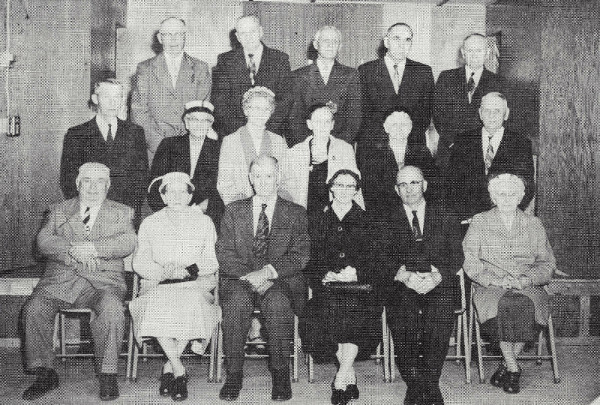
1960
Front row left to right: Carl Ballstadt, Mrs. Otto Luebke, Otto Luebke, Mrs. August Hasselbring, August Hasselbring, Mrs. William Bartels.
Second row: Charles Gerth, Clara Strutzenberg, Mary Burmeister, Volga Lichte, Mathilda Pohl, William Bartels.
Third row: Theo. Lenz, Walter Mehring, August Deimel, Christ George, Henry Neumann.
Trinity Senior Members

Helena Brown - age 82
R. Guy Brown - age 88
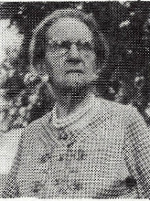
Amelica Luebke - age 97
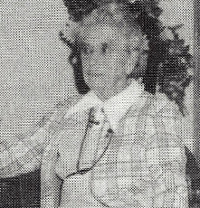
Eva Zehms - age 85
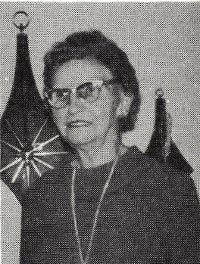
Mary Burmeister - age 86
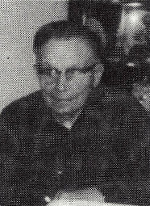
Carl Quade - age 83
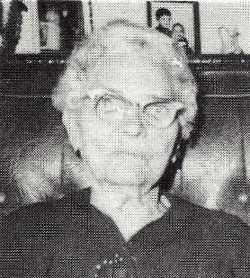
Mrs. Edith Ballstadt - age 85
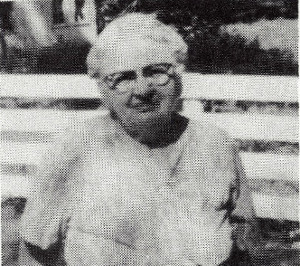
Minnie Gerth - age 84
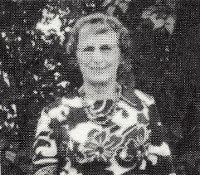
Mary Freimuth - age 84
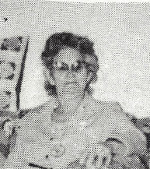
Elsie Andrews - age 83
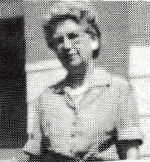
Hannah Ziegel - age 80
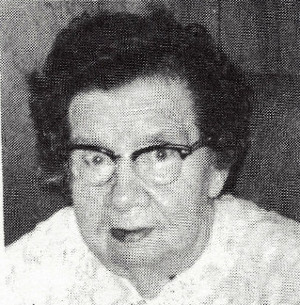
Tillie Zeckser - age 85
Passed Away December 27
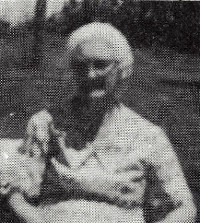
Emma George - age 84
Surely goodness and mercy shall follow me all the days of my life: and I will dwell in the house of the Lord forever.
Psalm 23:6
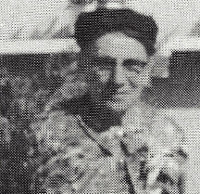
Anna Strutzenberg - age 87
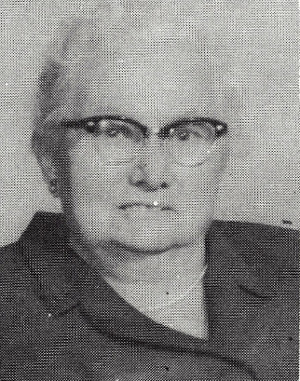
Anna Busse - age 90
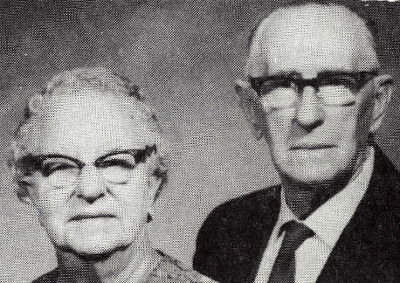
Emma Zell - age 81
Carl Zell - age 83
Blessed are they that dwell in thy house: they will be still praising thee.
Psalm 84:4
Sons of the Congregation In His Service
Other foundation can no man lay than that is laid, which is Jesus Christ.
1 Corinthians 3:11
Pastor William Krengel, son of sainted Mr. and Mrs. Henry Krengel, served at Marion, North Dakota.
Pastor George C. Ehlers, son of the sainted former Pastor of Trinity, Pastor F. Ehlers, served at Parkers Prairie, Minnesota.
Teacher George C. Ehlers, son of Pastor F. Ehlers, served at Merrill, Wisconsin.
Orville Ziegel, son of Mrs. Virgil Ziegel, studied at Concordia Theological Seminary, Springfield, Illinois. He served as teacher at Deer Creek Trinity parochial school 10 years and at present is a parochial school teacher at Fort Wayne, Indiana. He has served there the past 10 years.
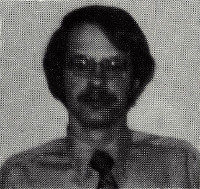
Stephan D. Rosendahl
Stephan D. Rosendahl, son of Mr. and Mrs. Richard Rosendahl, was born October 4, 1950. He was baptized October 29, 1950 at Trinity by Pastor Sylwester. He graduated from Manson Community High School in May of 1968. He attended Central Community College in Fort Dodge for one year and graduated from Concordia College, St. Paul, Minnesota, in November of 1973, with a B.A. degree. He was accepted at Concordia Theological Seminary, St. Louis, Missouri, in December of 1973. On April 4, 1975, he received his placement for Vicarage at Sagnaw, Minnesota, and began his Vicarage there June 1, 1975.
Stephan Rosendahl married Susan Babcock, daughter of Mr. and Mrs. Clarence Babcock, April 4, 1971, at Trinity Lutheran Church with Robert Buschkemper officiating.
In Memorium
Greater love hath no man than this, that a man lay down his life for his friends.
Matthew 15:13
Private Fred Nimke, son of Mr. and Mrs. William Nimke, was killed in action on November 6, 1918 in the Argonne Forest, France, World War I. He is buried in Arlington National Cemetery, Arlington, Virginia.
William Strutzenberg, son of Mr. and Mrs. Herman Strutzenberg, was killed by a Japanese land mine, World War II. He was buried in Trinity cemetery. Pastor Goehle was in charge of the service, Sunday, February 1945.
George Brown, son of Mr. and Mrs. Guy Brown, served in the Navy in World War II. He was lost at sea after landings of invasions of Africa and Sicily. Memorial services were held at Trinity May 26, 1946, with Pastor Goehle in charge.
Charles Ziegel, son of Mr. and Mrs. Virgil Ziegel, served in the Air corps, World War II. He died in a plane crash in New Mexico, November 10, 1944. Services were held at Trinity, with burial in Greenfield Township Cemetery with Pastor Goehle officiating.
Walter G. Meier, son of Mr. and Mrs. Walter Meier, served in the Infantry, World War II. He served in New Guinea and died at Sansapor. He was given a military burial at Manson Rose Hill Cemetery June 29, 1948, with Pastor Goehle officiating.
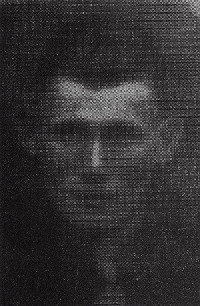
Fred Nimke
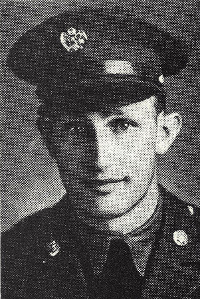
Pfc. Wm. C. Strutzenberg
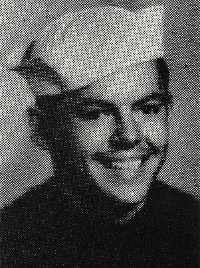
George E. Brown
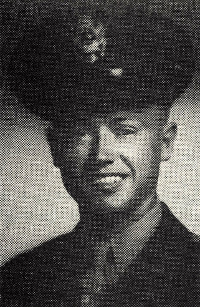
Lt. Charles H. Ziegel
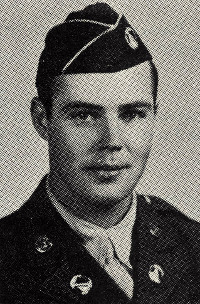
Elmer Meier
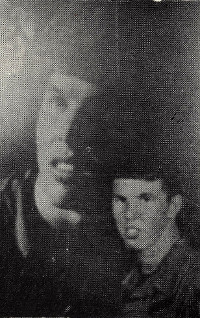
Frederick A. Holst
Frederick A. Holst, son of Mr. and Mrs. Martin Holst of Manson, Iowa, was killed in action October 9, 1970, in Vietnam in a non-combat accident. A gun being cleaned by a buddy accidentally discharged striking him.
Born in Lake City, Private First Class Holst was reared and received part of his education in Knierim. He moved with his family to Manson where he graduated from high school in 1968. He was inducted into the Army February 11, and completed his basic training in Fort Lewis, Washington. He had been serving in Vietnam since July. Freddie was 19 years old at the time of his death.
Honors awarded him posthumously are: "The Air Medal, Citation, by direction of the President of the United States, presented posthumously to Private First Class Fredrick A. Holst for distinguishing himself by meritorious achievement while participating in sustained aerial flight in support of combat around forces of the Republic of Vietnam during the period July 1970 to October 1970." During this time, he actively participated in more than twenty-five aerial missions over hostile territory.
"Citation, by direction of the President of the United States, the Bronze Star Medal, presented posthumously to Private First Class Frederick A. Holst for distinguishing himself by outstanding meritorious service in connection with ground operations against a hostile force in the Republic of Vietnam during the period July 1970 to October 1970. Through his untiring efforts and professional ability, he consistently obtained outstanding results."
Burial services were held at Trinity Lutheran Church with military graveside rites at Greenfield Township Cemetery, Knierim with Pastor Robert Bushkemper officiating.
Founders of Trinity
And the Lord, He it is that doth go before thee; He will be with thee, He will not fail thee neither forsake thee: fear not, neither be dismayed.
Deuteronomy 31:8
The charter members or founders of Trinity Lutheran church were: John Luebke, H. Mehring, F. Mehring, F. Hasselbring, William Knierim, C. Ballstadt, H. Grude, A. Lichte, A. Brandt, Fred Patzack, A. Rogosch, Lorenz Markert and R. Stahl.

Mr. and Mrs. Carl Ballstadt and son, Carl G.
Charles Ballstadt, Sr., was born in Warsin, Prussia, December 20, 1833. He was left an orphan when he was just a child. He served in the German army and from a mere pittance of pay saved enough to migrate to this country. Upon arrival in this country, his dreams failed to materialize, as the Civil War was brewing and as he had learned to espouse the cause of his country, he enlisted his services to preserve our government. He answered a second call and served until the end of the war. Many privations and hardships were endured and they resulted in poor health for him during the greater part of his life. He became a charter member of the local Grand Army Post.
He married Caroline Wendlandt March 22, 1869, in Milwaukee, Wisconsin. She was born February15, 1843, in the province of Posen, Germany. This union remained intact until death. Mrs. Ballstadt was a faithful companion during their entire married life, worked in the fields when needed, and often took the place of a nurse during his declining days and last illness, bearing all trials and tribulations with real Christian fortitude. Both were active members of the Lutheran church and found real comfort in the healing words of their Saviour.
The Spring of 1869, Mr. and Mrs. Ballstadt came to Iowa. They traveled by rail to Boone and drove an ox team to Calhoun County settling on a homestead one mile north of Knierim. The Illinois Central Railroad was just building out of Fort Dodge and the mail was delivered by stage to Yatesville, which post office was later changed to Manson. Wagon roads were unknown. The trail from the Ballstadt home to Manson was a northwesterly course varied only by the sloughs, which were innumerable. A trip to town was often postponed for a month on account of the impassible roads.
The Lord was gracious to this devoted couple in permitting Mr. Ballstadt to live to be almost ninety years old. The life of this couple is synonymous with the history of Calhoun County, for their entire life was devoted to building up the community and they suffered all the privation of the pioneering days.
They were the parents of the following children: Albert H., Rudolph C., Theodore L., Carl G., and Helena A. A daughter Anna died at birth. Burial was in Trinity cemetery. Mr. Ballstadt passed away in 1923 and the service was in charge of Pastor Mueller.
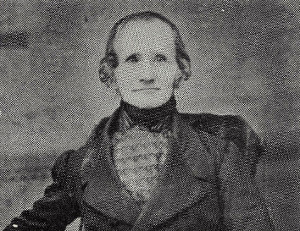
August Lichte
August Lichte was born in Germany. He married there and his wife died, leaving three children. In 1886, August Lichte and his only son, August Henry Ludwig Lichte came to the United States. They came to Iowa and homesteaded 80 acres in the northwest corner of Section 26, Lincoln Township, Calhoun County. He was a tailor by trade in Germany. He never worked at this trade in this country.
He helped build the railroad from Fort Dodge to Manson.
He died December 7, 1881, at the age of 65. He was one of the first to be buried in the church cemetery.
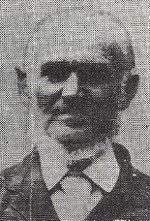
Lorenz Markert
Lorenz Markert was born November 30, 1817. His wife Theresia Markert was born May 30, 1821. She died November 24, 1895. Both are buried in Trinity Cemetery. Both were probably born in Germany. Their children were: Fred, Martin, Christina and Barbara Markert.
Frederich Dietrich Mehring was born August 15, 1840, in Hanover, Germany, the son of Frederich Mehring, Sr. Frederich came to America at the age of 21 and stayed at Champaign, Illinois, for a short time. In 1861, he came to the Knierim area where he spent the rest of his life. He married Johanna Elizabeth Sebrantke on February 8, 1871. The marriage was performed by the Reverend J.F. Daisheker.
Johanna Elizabeth Sebrantke was born July 4, 1851, in East Prussia, Germany, the daughter of Gottlieb and Elizabeth (Barlsche) Sebrantke. Johanna came to America with her father in 1867, when she was 16 years old. They settled first in Chicago, Illinois, then in Fort Dodge and later in Manson.
Johanna Elizabeth (Sebrantke) Mehring died November 4, 1916, age 63. Frederich Dietrich Mehring died August 8, 1921, at 80 years. Both are buried at Trinity Cemetery.
The Mehrings were the parents of 14 children who all grew to adulthood. Only one of the fourteen are living. She is Mrs. Anna Marie (Mehring) Hall living at the Good Samaritan Center in Manson. Her age is 85 years. Frederich Mehring lived on the farm where Heine Meils lived before retiring.
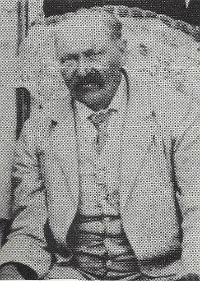
Frederic Mehring
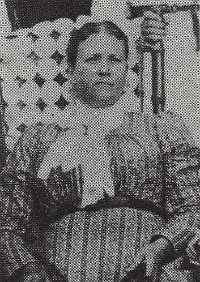
Johanna (Sebrantke) Mehring
Mrs. Johanna Ida (Mehring) was the first child baptized in the church of Knierim Trinity. Church was held in the homes or schoolhouse at that time. She became the wife of John G. Carstens of Manson, Iowa. She was born May 31, 1879, and died March 22, 1956.
John Luebke, Sr., was born in Schlos Krange in the province of Pomerania, Germany, on March 17, 1837. He emigrated to the United States when he was 21 years old. He went to Milwaukee first, where he worked in the brickyards for nine months. From there he went to Illinois where he worked as a farmhand. John went back to Milwaukee for a short time before coming to Iowa, where in 1862, he purchased a homestead in Section 36 of Lincoln Township, Calhoun County. He was the second settler in Lincoln Township.
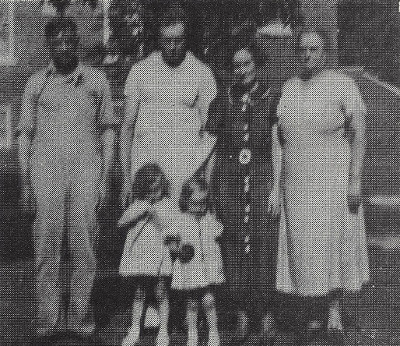
John Carstens, Fred Moelhman, Lucille Moelhman, Ida Carstens, Jean and Joyce
On March 5, 1870, he married Frederika Kann of Fort Dodge. She had emigrated to Fort Dodge from Klute, Germany. Frederika was the sister of Mrs. William Knierim, Sr.
Ten children were born to this union, nine sons and one daughter. Two of these sons died in childhood.
John Luebke, Jr. was born December 23, 1873. He married Alvina Hasselbring in March of 1892. They retired in Fort Dodge in 1920. He passed away in 1938. There were no children.
Otto Luebke married Amelia Hasselbring, who at this time is the oldest living member of Trinity Lutheran Church. Otto Luebke was the oldest living member of the church at the time of the 75th Anniversary of the church in 1950. Their daughter is Mrs. Earl Martin of Manson. Amelia makes her home with the Martins. Amelia was a charter member of the Trinity Ladies Aid.
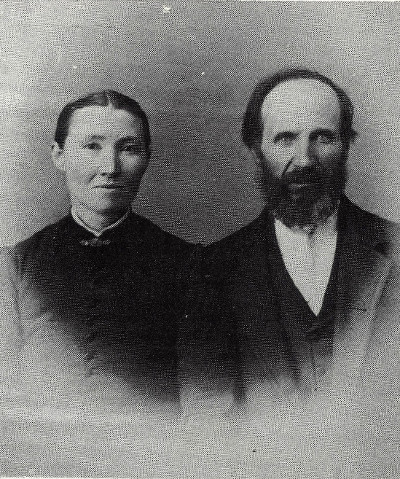
Mr. and Mrs. John Luebke, Sr.
Henry Luebke was born December 9, 1870. He married Bertha Hasselbring. They retired in Fort Dodge and transferred membership to St. Paul's Lutheran Church from Trinity where they worshiped while farming near Knierim. There were two children, John A. and Ella Luebke. John A. passed away in May of 1968. Ella Luebke Pritchett lives in Des Moines and is the mother of two children. Bertha Luebke was a charter member of Trinity's Ladies' Aid.
Theodore Luebke was born January 17, 1878. He was baptized and confirmed at Trinity and was a lifetime member. He farmed near Knierim and worked as a carpenter and painter. He was unmarried and passed away in 1956.
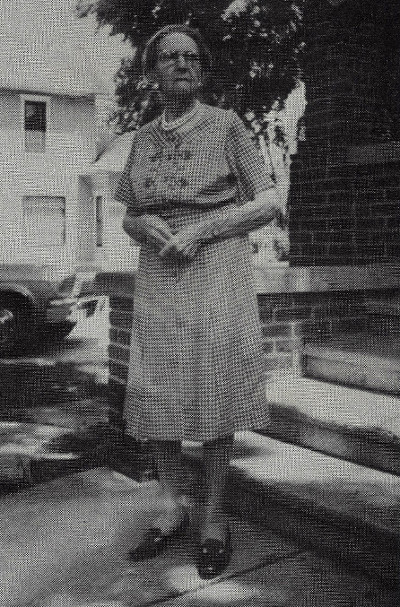
Amelia Luebke
Trinity's Oldest Living Member
Ernest Luebke was born July 25, 1884. He was baptized and confirmed at Trinity. He married Elizabeth Hartwig December 4, 1907. He farmed the first farm west of the church for 36 years. He retired in 1944 and moved to Fort Dodge and became a member of St. Paul's church. He was killed in a car accident in 1951. Mrs. Luebke was a charter member of Trinity Lutheran Ladies' Aid and resides at this time at Sunnyview retirement home, Rockwell City. Edgar, a son, operates the home farm west of the church at this time. His wife, Luella Doster Luebke, passed away in January 1974. They were the parents of three children, Erwin, Sylvia and Robert. Erwin is the present secretary of the Trinity Congregation, and he and wife, Gladys, have two children. Erwin works at U.S. Gypsum in Fort Dodge as an engineer. Sylvia is Mrs. Larry Sorenson of Eau Claire, Wisconsin, and is the mother of three children. She is a registered nurse. Robert is a Doctor of Dentistry and at present is attending graduate school at University of Iowa, Iowa City and also working as a dentist at the Veterans Administration Hospital. Robert and his wife Marilyn have three children. Edgar, the father, has a degree in engineering from Iowa State University and the mother, Luella, received her B.A. in Education from Drake University.
George Luebke born August 16, 1887, married Mathilda Zehms and farmed 1 ½ miles east of Trinity. There was one daughter, Marion, now Mrs. Richard Davis. She resides in Fort Dodge and the mother, Mathilda, lives with her. There are two Davis children, Marilyn and Dean.
Lena Luebke was born January 23, 1882. She was baptized and confirmed at Trinity and married August Hasselbring, June 28, 1905. They had one daughter, Florence, who married Laurence Doster. Florence passed away in 1946. They were the parents of Maris Doster. Lena Hasselbring passed away in 1959 and August in 1971. All were lifetime members of Trinity.
Paul Luebke married Helen Schoon at Trinity Lutheran Church, May 30, 1917. They farmed the old Luebke homestead (where Eldon Beckley lived many years) until 1940 when they moved to Fort Dodge. There were no children. Paul passed away in 1972. Helena died in July of 1968.
John Luebke, Sr., one of the founders of Trinity passed away in 1930 and his wife in 1920. Both are buried in Trinity cemetery.
Reimond Stahl was born in Germany on October 1, 1834. As a young boy he came to the United States, settling in the Chicago area. He married Margaret Markert and they settled on a farm near Knierim. William, Charles and Richard Stahl were born to them, as well as Reimond, who died in infancy. The baby was the first child buried in Trinity cemetery and lies along side of his mother who died in childbirth.
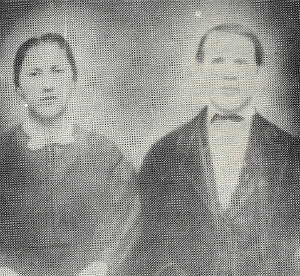
Mr. and Mrs. Reimond Stahl
Reimond Stahl was later married to Elizabeth Straus. Several years later the family moved to a farm near Fort Dodge. Their children are Paul Stahl, Mrs. Peggy Carlson, Mrs. Pauline Ricke, Mrs. Emma Kolb, and Reinholdt, who died in infancy. Mrs. Peggy Carlson, a resident of Ellen's Nursing Home, and Mrs. Pauline Ricke, who resides with her daughter, Mrs. Paul Timm, in Webster City, survive.
Reimond Stahl died November 14, 1913 and is buried in Fort Dodge.
Mr. and Mrs. William Knierim, Sr., came from Germany in about the year of 1863. They lived in a sod house east of Knierim. The town of Knierim was platted on their land some years later and was named for the family.
They were the parents of three children: Lena Knierim Doster, Louis Knierim and William A. Knierim. Lena married Gottlieb Doster and their children were Mary Burmeister, Mrs. (Lena) Denver Rose, Mrs. Bertha Rogosch, August and Henry Doster. Gottlieb's second wife was Ida Wendt and she was the mother of John Doster. Gottlieb's brother, August, came from Germany in 1884 and married Anna Freimuth. Their children were Alma, Laurence (married Florence Hasselbring), Charles, Luella (Edgar Luebke's wife), Wilbur and Elmer.
Louis Knierim never married and lives at the Good Samaritan Home in Manson.
William A. Knierim married Verna Omann and they are the parents of two children, Kenneth and Carol. They retired in Manson, Iowa.
All the members of the Knierim family were life-long members of Knierim Trinity Church.
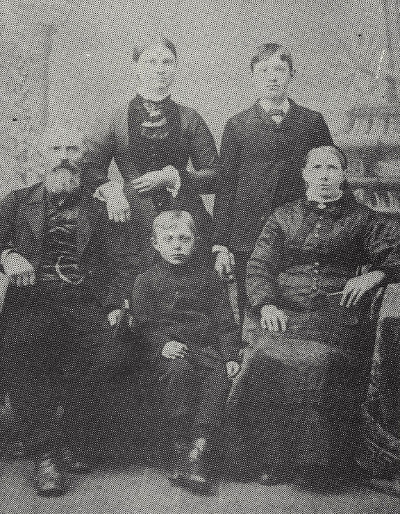
Mr. and Mrs. William Knierim and Family
Fred Hasselbring (1839-1918) and his wife Marie Hasselbring nee Mehring (1843-1916), with their small son, Fred, came to the United States from Hanover, Germany, in 1866. They stayed in Illinois for about a year and then came to Fort Dodge. Mr. Hasselbring worked on the railroad construction crew for Dubuque, Sioux City and Western Railroad.
As he worked west into the vicinity of Barnum, he liked the land there and decided to homestead. He acquired a quarter of a section of land in Johnson Township, Webster County, in the year of 1869. He and his wife lived on this farm for forty year raising a family of ten children. The house was 105 years old when it was destroyed to make room for a new one. They acquired many more acres of land as the years passed.
The Hasselbrings were organizers and charter members of the German Lutheran church north of Knierim, now known as Trinity Lutheran Church of Knierim.
Three of their daughters and one son married three sons and a daughter of the John Luebke, Sr., family and three daughters married three sons of the Quade family, who were also early settlers of the area.
The ten children were: Fred (1865-1940) married Minnie Freeze, six children; Ida (1868-1944) married William Quade, six children, Darrel Bemrich, grandson; Bertha (1870-1960) married Henry Luebke, two children; Mary (1872-1949) married Fred Wellen, two children; Alvina (1874-1958) married John Luebke, no children; Amelia (1876-) married Otto Luebke, one child (Mrs. Earl Martin); Henry (1878-1949) married, and moved to Michigan, six children; Emma (1881-1963) married Anton Quade who died and she married Herman Stacy, no children; August (1883-1971) married Lena Luebke, one child, Maris Doster, grandson; Anna (1889-) married Carl Quade who died, married George Brown, two children, Elmer Quade, son, lives in Barnum.
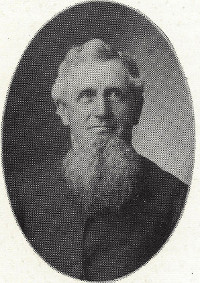
Fred Hasselbring
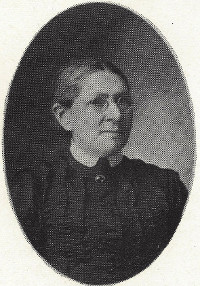
Mrs. Fred Hasselbring
A. Rogosch and Emilia were founders of the church. Baptismal records show children: Fred, Esther, Ida and Dora and marriage records of a daughter Emilie.
Fred Rogosch married Bertha Doster and their children were: Curtis, Vernon, Robert, Arlene and Esther. The family moved to Wisconsin from Knierim where they had lived in the Christ George house. Bertha passed away during the past year. The girls still live in Wisconsin.
H. Mehring and Sophia, nee Zakobs, were residents of the Trinity area. Their children were Henry, William Henry Frederick, Bertha and Fred, according to early baptismal records.
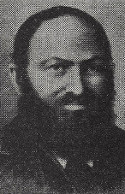
H. Mehring
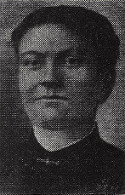
Mrs. H. Mehring
Ferdinand Patzack farmed near Crilly Crossing, which is located two miles west of Knierim. From the farm he moved to Manson where he ran a jewelry store until he passed away. He is at rest in Greenfield cemetery, ½ mile south of Knierim.
Fred Class married Ida, a daughter of Ferdinand Patzack, and the family lived east of the church, where Millers live. Their children were: August, who ran a county road grader and now lives in Knierim; Roy, who lives in Rockwell City; Ella who lives in Knierim; Fred Jr., John and Julius who live in Minnesota; Carl who lives at Twin Lakes; Bertha of Rockwell City; Helen of Paton; and Ethel who lives in Illinois.
Henry Gruber and Cathrina Gruber are buried in Greenfield cemetery. Henry Gruber was born in 1823 and passed away in 1895. Cathrina Gruber was born in 1845 and passed away in 1934.
August C. Brandt, father, was born September 17, 1858, and passed away October 18, 1923. The mother, Clara Brandt, was born October 2, 1861, and passed away June 4, 1916. Both are buried in Greenfield cemetery.
God's Invisible Presence
Psalm 121:1-4
I will lift up mine eyes unto the hills, from whence cometh my help.
My help cometh from the Lord, which made heaven and earth.
He will not suffer thy foot to be moved; he that keepeth thee will not slumber.
Behold, he that keepeth Israel shall neither slumber nor sleep.
In Memorium...
Luella Doster Luebke
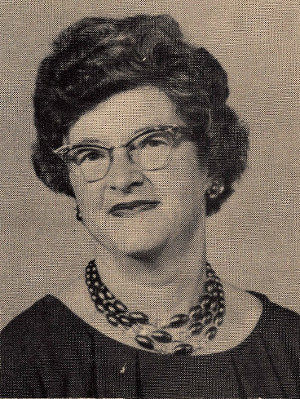
Luella Doster, the daughter of Mr. and Mrs. August Doster, was born near Knierim, January 12, 1908. She was baptized, confirmed, and married at and laid to rest from Knierim Trinity Lutheran Church to the Trinity cemetery near the church. She used her God-given talents all her life to build her church and her community by teaching Sunday School, teaching public schools, singing in the choir, and being active in Ladies' Aid and glorifying God by serving her fellowman.
She attended schools in Knierim and Rockwell City, and later Teacher's College at Cedar Falls. She used this education teaching eight years in and near Knierim and in Johnson Township Consolidated School and Northwest Webster Community School at Barnum from 1954 until 1971. While teaching, she attended additional courses of study until she received her B.A. in Education from Drake University in 1966. She was taken by the Lord January 31, 1974.
She married Edgar Luebke, son of Mr. and Mrs. Ernest Luebke, in 1935. The wedding was the first performed by the late Reverend Ross at Trinity. God blessed this couple with three children, twon sons, Erwin adn Robert, and one daughter, Sylvia.
Luella left her family a heritage of great courage for the future and even greater love for her Saviour and fellowman. She loved her family with a sort of breathless happiness which tended to radiate to others.
Her childrer, Edwin, Robert and Sylvia, and husband, Edgar, wish that her memorials, given in her memory, be used to print this book to further the celebration of Trinity Lutheran Church's Centennial as a thankful tribute to God and his instrument, the church, which was so active in shaping her Christian life.
God bless her memory and the church!


